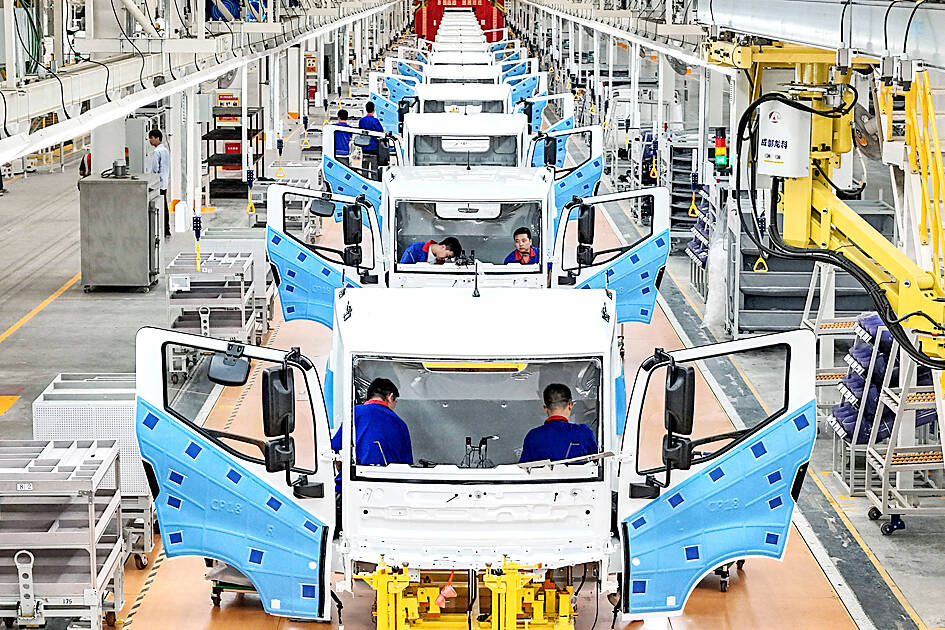Chinese manufacturing contracted for a fourth consecutive month last month, official data showed on Saturday, a worse-than-expected result reflecting the world’s second-largest economy’s struggle to recover.
The purchasing managers’ index — a key barometer of industrial output — stood at 49.1 points last month, China’s National Bureau of Statistics said.
This represents a stronger contraction than in July (49.4 points) for the index, which is based in part on company order books.

Photo: AFP
A figure above 50 indicates an expansion in manufacturing activity, while below that is a contraction.
Analysts surveyed by Bloomberg had anticipated a decline for last month — but a more moderate one of 49.5.
China’s post-pandemic recovery has been brief and less robust than expected.
While some sectors have largely regained their strength — including tourism and the auto industry — others are struggling, particularly real estate, a key growth driver.
In mid-August, China released a series of economic indicators deemed disappointing despite recent government measures aimed at boosting growth.
The nation’s residential slump deepened last month, as expectations of a further drop in new-home prices hampered the country’s efforts to cushion the downturn.
The value of new-home sales from the 100 biggest real estate companies fell about 26.8 percent from a year earlier to 251 billion yuan (US$35.4 billion), more than the 19.7 percent decline in July, according to preliminary data released by China Real Estate Information Corp on Saturday.
The accelerating slide shows the waning impact of the latest rescue package unveiled in May. The sector continues to be a drag on China’s economy, which needs more stimulus to meet the government’s 5 percent growth target this year, Bloomberg Economics said.
China has been considering a new funding option for local governments to buy unsold homes to prop up the market, people familiar with the matter said last month. The latest proposal would allow local governments to fund their home purchases via so-called special bonds, they said.
Cash-strapped developers — many in default for more than a year — are counting on a sales revival to persuade debt holders and fight off liquidation. Dexin China Holdings Co (德信中國控股) in June became the latest builder to be ordered to liquidate by a Hong Kong court, while Country Garden Holdings Co (碧桂園) is considering extending payments on some of its yuan bonds again.

TAKING STOCK: A Taiwanese cookware firm in Vietnam urged customers to assess inventory or place orders early so shipments can reach the US while tariffs are paused Taiwanese businesses in Vietnam are exploring alternatives after the White House imposed a 46 percent import duty on Vietnamese goods, following US President Donald Trump’s announcement of “reciprocal” tariffs on the US’ trading partners. Lo Shih-liang (羅世良), chairman of Brico Industry Co (裕茂工業), a Taiwanese company that manufactures cast iron cookware and stove components in Vietnam, said that more than 40 percent of his business was tied to the US market, describing the constant US policy shifts as an emotional roller coaster. “I work during the day and stay up all night watching the news. I’ve been following US news until 3am

UNCERTAINTY: Innolux activated a stringent supply chain management mechanism, as it did during the COVID-19 pandemic, to ensure optimal inventory levels for customers Flat-panel display makers AUO Corp (友達) and Innolux Corp (群創) yesterday said that about 12 to 20 percent of their display business is at risk of potential US tariffs and that they would relocate production or shipment destinations to mitigate the levies’ effects. US tariffs would have a direct impact of US$200 million on AUO’s revenue, company chairman Paul Peng (彭雙浪) told reporters on the sidelines of the Touch Taiwan trade show in Taipei yesterday. That would make up about 12 percent of the company’s overall revenue. To cope with the tariff uncertainty, AUO plans to allocate its production to manufacturing facilities in

Six years ago, LVMH’s billionaire CEO Bernard Arnault and US President Donald Trump cut the blue ribbon on a factory in rural Texas that would make designer handbags for Louis Vuitton, one of the world’s best-known luxury brands. However, since the high-profile opening, the factory has faced a host of problems limiting production, 11 former Louis Vuitton employees said. The site has consistently ranked among the worst-performing for Louis Vuitton globally, “significantly” underperforming other facilities, said three former Louis Vuitton workers and a senior industry source, who cited internal rankings shared with staff. The plant’s problems — which have not

COLLABORATION: Given Taiwan’s key position in global supply chains, the US firm is discussing strategies with local partners and clients to deal with global uncertainties Advanced Micro Devices Inc (AMD) yesterday said it is meeting with local ecosystem partners, including Taiwan Semiconductor Manufacturing Co (TSMC, 台積電), to discuss strategies, including long-term manufacturing, to navigate uncertainties such as US tariffs, as Taiwan occupies an important position in global supply chains. AMD chief executive officer Lisa Su (蘇姿丰) told reporters that Taiwan is an important part of the chip designer’s ecosystem and she is discussing with partners and customers in Taiwan to forge strong collaborations on different areas during this critical period. AMD has just become the first artificial-intelligence (AI) server chip customer of TSMC to utilize its advanced